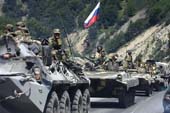Tbilisi worried about Russian “maneouvres”
By Temuri Kiguradze
Tuesday, April 14

“Based on reports, we believe that a large number of vessels from the Russian Black Sea Fleet departed from the port of Sevastopol bound, according to a formal statement, for Novorossiysk. This movement resulted in a concentration of missile cruisers, missile boats, landing ships, anti-submarine ships etc - a total of at least twenty military vessels equipped with weapons - in the immediate vicinity of Georgia. We believe there are also plans to launch various types of military aircraft and helicopters from military airbases located near the borders of Georgia,” states the Ministry.
This activation of Russian troops was the main topic discussed at a meeting between Defence Ministry representatives and foreign diplomats on the evening of April 13. At this meeting the Georgian side also noted that the movement of armed Russian naval vessels in the Black Sea coincides with the strengthening of the “military build-up on the occupied territories of Georgia.”
De facto Abkhazian Foreign Minister Sergey Shamba confirmed the information on the movement of Russian troops in breakaway Abkhazia. “These actions are designed to provide security for the population of Abkhazia and prevent possible provocations [from the Georgian side],” said Shamba, interviewed by the Georgian Rustavi 2 channel.
The Ministry’s statement is the latest in a line of several similar statements by Georgian politicians, including one in which the Georgian President said that Russia seems to be conducting some kind of “military provocation” against Georgia, taking advantage of the internal instability caused by the protest rallies organized by the Georgian opposition. “This threat is real, but its realisation is dependent on the actions of the Georgian side and the general situation in the country,” stated Georgian State Minister on Reintegration Issues Temur Iakobashvili, speaking to the local media on Monday.
“The Ministry of Foreign Affairs of Georgia emphasizes that such actions by the Russian side serve the sole purpose of provoking instability and bringing about the extreme escalation of the situation around Georgia,” says the Foreign Ministry’s statement. The Ministry also urges the international community to give “due attention to the Russian side's dangerous maneouvres” and use all political or diplomatic strength prevent the further escalation of the situation and make the Russian side refrain “from undertaking possible provocations.”
In recent weeks the number of incidents taking place at the administrative borders of Georgian regions Abkhazia and South Ossetia has increased. On Sunday night a powerful blast occurred in the centre of South Ossetian capital Tskhinvali. On Monday the Georgian media reported that a “group of Ossetian-speaking armed persons” had entered a school in the Georgian village of Adzvi, on the administrative border with South Ossetia. According to local residents and the Georgian police the attackers broke into the school building, assaulted the school’s security guard and took away equipment from the computer class of the school. According to the Georgian side these and other incidents show that Russian troops “provide the only source of the escalation of violence on Georgia's occupied territories and only after their total withdrawal can any talks regarding the creation of real guarantees of security become possible.”
“The movement of Russian troops is quite understandable. If you recall the events of November 2003 [The Rose Revolution] you will remember that at that time the Russian Army was also actively moving towards the Georgian borders,” says Georgian military expert Koba Liklikadze. “They [Russian side] explain this by the fact that the political situation in Georgian is extremely unstable and this may harm neighbouring Russia or the Georgian breakaway regions,” Liklikadze says, adding that further developments are unpredictable. “Considering that Russia has attacked Georgia and occupied it territories no one can say what it will do next. The statement of the Georgian Government may be correct, because it would not be difficult for Russia to send its troops into Georgia to “prevent a civil war,” however the threat of this may also be overestimated, as nothing is yet known about the quantity of soldiers and equipment massed at the [administrative] borders,” Likladze affirmed.
